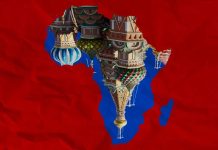Africa-Press – Mauritius. The first of May or Labour Day is a special occasion when the struggle of the Mauritian workers for their social, economic and political rights is commemorated.
During the late 1930s and 1940s, it was mainly through their actions and unrelenting determination that Mauritian workers were the builders of modern Mauritius.
One of the most important episodes in the struggle of the early Mauritian Labour Movement was the Port Louis dockers’ strike of September 1938. ■ The strike begins On 1st September 1938, a general strike began in Port Louis that lasted for around 22 days.
Between 2,500 and 3,000 dockers participated in this well-organized work stoppage which paralyzed Port Louis harbour as well as the island’s economy. On 6th September, the strike was declared to be illegal by a local magistrate and the dockers were ordered back to work which they flatly refused.
During that same day, with an escalation in this crisis, governor Bede Clifford declared a state of emergency which provided him with very broad powers. More than twenty years later, in Zamana, a local colonial newspaper printed by Basdeo and Sookdeo Bissoondoyal, Dr.
Maurice Curé gave a dramatic account of what happened, during those days of crisis for the Labour Party, as the repression by local British administration began in earnest.
The labour leader wrote: “A onze heures de la nuit du 7 septembre. . . je fus réveillé pour recevoir deux officiers de la police et un ordre du gouverneur me privant de la libertés de mes mouvements.
Le lendemain je vis ma demeure entourée de policiers. Les territoriaux en armes circulaient dans les rues avoisines. ” ■ Labour Party leaders Dr. Curé, the president of the Mauritian Labour Party, was placed under house arrest at his residence in Curepipe for a period of twelve days.
Earlier during the same day, Emmanuel Anquetil was arrested at his home in Rose-Hill and briefly incarcerated at the Casernes Centrales in Port Louis.
On 8th September, Colonel Deane, the Commissioner of Police, informed Anquetil that the colonial government had decided to deport him. During the same evening, the labour leader, accompanied by his son, was placed on board the Bontekoe, a British warship, which sailed for Rodrigues.
Anquetil would remain in exile in that Mauritian dependency until the end of November or for a period of two and a half months. He was returned to Mauritius thanks largely to the efforts of Dr.
Curé and Jomadar, a Mauritian student in Great Britain with intimate links with the Mauritian Labour Party, and Creech Jones, a member of the British Parliament who belonged to the British Labour Party.
The other leaders of the Mauritian Labour Party such as Pandit Sahadeo was also placed under house arrest, while Assenjee, party treasurer, Marc Abel, chief party agent, and Emile Pitchen, party agent, were put under strict police surveillance.
In addition, 287 striking dockers were arrested and imprisoned by the police. The island’s major newspapers, such as Le Mauricien and Le Cernéen, neither supported the striking dock workers nor condemned the draconian measures taken against the leaders of the Labour Party.
In December 1958, while looking back at the local British administration’s repression during September 1938, Dr. Curé wrote: “Le gouvernement avait fait une démonstration de force, sans raison sérieuse, qui avait eu comme résultat de décourager beaucoup de nos partisans.
The British strategy Governor Bede Clifford used everything in his power to weaken the Labour Party as well as the will of the striking dockers. The British pro-consul was following a two-pronged strategy to bring the situation back under control.
In his biography on Emmanuel Anquetil, Rivaltz Quennette, a Mauritian historian, eloquently explained: “Ayant ainsi frappé un grand coup, Sir Bede Clifford se livra à une double préoccupation.
En premier lieu, décongestionner le port en dépit de la grève et ensuite mener une campagne d’envergure contre l’influence travailliste à travers le pays et plus particulièrement au sein des associations industrielles. Il devait s’y prendre avec une rare habilité.
” On the night of 8th September, local colonial officials, by working together with the sugar planters, brought around 340 labourers from different sugar estates to start loading the sugar bags into ships which were anchored in Port Louis harbour.
These men, known as ‘débardeurs’, were rural workers who earned their living by carrying sugar bags on sugar estates, generally to be loaded onto trains which were bound for Port Louis.
During this brief period, these rural workers were housed and fed in Port Louis harbour by the local British colonial government until the situation returned to normal.
Through their meticulous planning, the British colonial administrators and the sugar magnates were able to break the will of the dockers to continue with their work stoppage.
Despite this fact, the historical significance of this labour strike cannot be underestimated because it was the first major labour work stoppage which paralyzed the island’s economic life.
It demonstrated to the local British government, the power of an organized Mauritian Labour Movement which was led by Dr. Maurice Cure and the Mauritian Labour Party.
It should also be noted that another major outcome of this historic labour strike was that local British officials continued with their campaign to weaken the Labour Party and to make life difficult for its leaders, like Dr.
Maurice Curé, Emmanuel Anquetil and Pandit Sahadeo. Labour Day is a special day and one of deep reflection for the citizens of Mauritius on the toils, tears, and sacrifices of the Mauritian working class such as the Port Louis dockers in September 1938.
Today, it is our duty to pay tribute to the Mauritian workers as the builders of modern Mauritius as well as the makers of their own history. Furthermore, they must also be honoured as those who contributed a great deal to our social and political liberation and paved the way for Mauritian independence.
For More News And Analysis About Mauritius Follow Africa-Press







